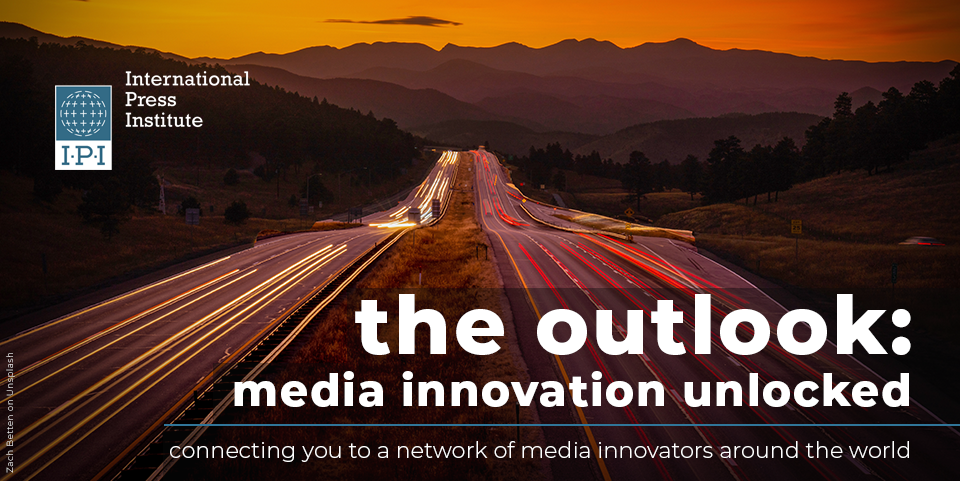This text comes from IPI’s newsletter The Outlook. Click here to sign up to receive future editions direct to your inbox.
The Outlook – IPI’s media innovation and sustainability newsletter – will focus on a different challenge to media practitioners in each issue, and explore how newsrooms around the world are approaching it. This week, we’re asking how to reach out to people that have become disengaged from the news.
We’re looking at how IPI network members in Brazil are rebuilding relationships with local communities by involving them directly in the fight against disinformation, and how reframing the question of ‘news avoidance’ can help you make your journalism more inclusive and effective.
First, two invitations: Join IPI’s Local News & Innovation Network on Slack! It’s a growing community of local news practitioners, and a space to ask questions, share experiences and be the first to hear about opportunities. Click here to join.
We’ve also opened applications for IPI’s Local News Accelerator: click here to find out more and apply. In a nutshell, this is a three-month programme for new or established media organizations that serve news to local and niche communities. Successful applicants will get mentoring, training and skills development tailored to their business or news product challenge.
The challenge: Disengaged audiences
In Brazil, where trust in news has been weakened by repeated attacks on the press from the former Bolsonaro regime, a new group of emerging media is rebuilding fractured relationships with the public. They’re doing this by working directly with members of communities that have traditionally been underserved by the media, involving these groups in the fight against disinformation.
Click here to read the full article.
- Catch up on the IPI World Congress session about disruption in local news, featuring Agência Mural, one of the organizations in the article above (1-hour video).
- And one more Brazilian journalism success story that has diversity at its heart: read an interview with the journalist whose podcasts retelling Brazil’s Black history have been downloaded over 650,000 times.
The solution: Target ‘news outsiders’
If we want to increase trust in news, we’re going to need to do some things differently. ‘News outsiders’ may be exactly the ones to help you figure out what, and how.
We’re borrowing this term ‘news outsiders’ from Schibsted’s Agnes Stenbom, who argues it’s more suitable than ‘news avoiders’, which puts the onus to change on the consumer rather than the media. At IPI’s Media Innovation Festival, Stenbom explained how her team at Schibsted spoke directly to people disengaged by the news (in this case, young residents of Stockholm’s outer suburbs) to co-create product ideas that would make the news more useful to their lives.
The results range from an AI therapist to help readers work through emotions related to the news, to platforms where locals could verify and respond to content about their community.
💡 The Takeaway: Sometimes, innovation needs to mean serving new people, not just the same people in new ways.
If you don’t know the current demographics of your audience, start there, and see where the gaps are. Once you know the gaps, brainstorm ways to get in touch with the groups you’re currently not reaching, which could start with an online survey or showing up at a community event.
Try to avoid assumptions – find out what these groups need from the media, and learn more about their lives so that you can identify how your news can serve them.
News from IPI’s Media Sustainability Team
At the top of this email, we mentioned our Local News & Innovation Network channel on Slack. You can click here to join this growing group of local news innovators.
The Local News & Innovation Network is open to people working in local news who are interested in media innovation, whatever your job title or seniority level. This includes those with editorial, tech, audience or product roles, and those in organizations whose work supports local journalism.
Funding opportunities for media companies
- As mentioned above, applications are open for IPI’s own Local News Accelerator. This is for both new and established media organizations that are dedicated to serving news to local and niche communities.
- Africa No Filter offers grants of up to $5,000 for African creators (based in Africa or the diaspora) telling stories about climate change
- And climate journalists based in Europe can submit their stories for European Journalism Centre’s inaugural Climate Journalism Award
IPI’s media innovation and sustainability work is made possible with support from the European Union, Friedrich Naumann Foundation and ERSTE Foundation




